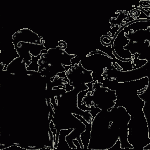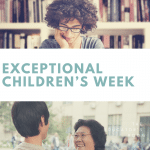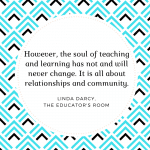I remember the first student I taught who had been diagnosed with autism very well.
“Ms. Lamons, you need to fix the date on the board.”
“Ms. Lamons, I need to know what we are doing today.”
“Ms. Lamons, I finished my work. Now, what do I do?”
John had what some described as a “robotic” cadence. He spoke with an emotionless matter-a-fact tone that I soon came to understand was common among many kids with autism. I knew just enough about autism to know there was no monolith or archetypal behaviors shared by all those on the spectrum. For example, the almost uncomfortable way that John stared into my eyes whenever he spoke to me was “atypical” for someone who was allegedly supposed to avoid eye contact. John taught me to be better prepared with lesson plans and daily agendas and provide tasks or extra work for those who finished their work early.
Over the past twenty-plus years teaching mainstream English and American Sign Language, I have only had a handful of “Johns”. But I know that many of my fellow educators and others have noticed a significant increase in students with autism in their classrooms. Now raising my own son with autism, I have had to learn to navigate both worlds as a mother and teacher of children with neurological diversity.
Parenting an Autistic Son
Looking back, many of us can think of someone we knew – a neighbor, classmate, or family member – that we may think could have had undiagnosed autism. To this day, I have had conversations with friends and families who think that their diagnosed Obsessive-compulsive disorder (OCD) might still be a form of undiagnosed autism. So as both a parent of a child with autism and an educator who has current and inevitably future students with autism, how can I learn to be better equipped to teach my own son and my future students?
The biggest difference between my personal experience as a mother of a child with autism and my current experiences teaching students with autism is that I teach high school and college. I have no idea how to navigate the elementary world of education, let alone the neurologically diverse mind of a child with autism entering school for the first time. So, I have had to do my own research.
I have been able to tap into a network of educators, administrators, specialists, therapists and even advocates in my quest to learn all I can. In my continued research, I have come across some great articles and websites that have helped me learn so much more about autism.
“A Teacher’s Brief Guide to Teaching Students with High-Functioning Autism”, by Susan Moreno, Indiana Resource Center for Autism, Applied Behavior Analysis Program’s “30 Things All Teachers Should Know About Autism in the Classroom”, and the NEA’s toolkit “Teaching Students with Autism: A Guide for Educators” for those ambitious ones willing to navigate all 96 pages are just a handful of resources I have found helpful.
As I talk to fellow educators of all levels of education, even some of my special education teacher friends, many of us feel ill equipped to effectively differentiate our curriculum and pedagogy for students with autism. Knowing this, what can school districts do to help prepare us; or at least provide us with opportunities to better prepare ourselves? Here are a few suggestions.
Provide paid professional developments on autism
As both a parent and a teacher, I would attend these trainings even if they were not paid. But the educator in me knows that we should always pay teachers for their time. That being said, there are several free professional curriculums out there. “Understanding Autism: Professional Development Curriculum” by the Organization for Autism Research is a great place to start.
Add autism training to all teacher credential programs
The strategies I have found in my research to learn how to teach my own son, as well as my students with autism, could be applied to all learners. Paula Kluth’s “Supporting Students with Autism: 10 Ideas for Inclusive Classrooms“ is a perfect example of something I recently came across. All teachers can benefit from “learn[ing] about the learner from the learner.” Teachers can use this and other strategies she discusses to support students with autism and apply them to all learners.
Offer autism-specific supplemental credentials for all teachers
As lifelong learners, teachers often attend workshops, seminars, and classes for professional growth as well as to fulfill criteria like adding, updating, or clearing credentials. Due to the increase of autism in our classrooms, I know many of us would take advantage of this opportunity to learn how to better support our neurologically diverse learners.
So as we enter another April celebrating Autism Awareness Month, let’s think of ways to help both parents and educators continue to learn about, teach and support this beautiful neurodiverse group of learners that are helping us become better teachers of all students.






